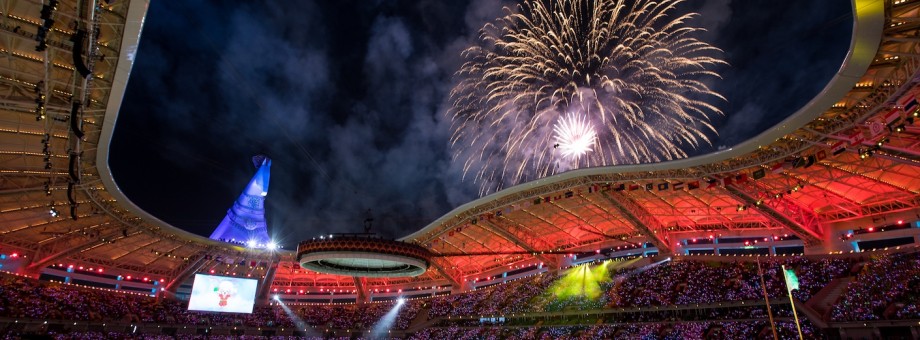Twelve days of glorious sport. Medals, results, facts.

After 12 days of thrilling competition, the Ashgabat 2017 5th Asian Indoor and Martial Arts Games came to an end on 27 September. Across 21 sports in 15 venues history was made and stars born. The city successfully hosted a superb showpiece that was broadcast throughout Asia and Oceania and beyond.
Thousands of visitors to the gleaming new Ashgabat Olympic Complex witnessed a festival of top-level sport. From the Wrestling mats of the Main Indoor Arena, across Futsal, 3x3 Basketball, Equestrian Jumping and Indoor Tennis, to the Ju Jitsu, Kurash and Sambo at the Martial Arts Centre, medals were won, records set and friendships made.


The medal table was dominated from start to finish by the host nation Turkmenistan, which piled on a huge tally of gold medals in the early stages of the Games. Its total gold medal count of 89 included 39 gained in Belt Wrestling, and 23 in Traditional Wrestling. It won 245 medals in total.
After a slow start, China steadily moved through the medal ranks to finish second on 42 gold, with strong showings in Short Course Swimming, Dancesport, Weightlifting and Billiards.
Iran was third, with 36 gold won. Its strengths were in Wrestling and Taekwondo, and its men’s Futsal team were in terrific form, winning the gold in style.
Iranian weightlifter Sohrab Moradi provided one of the images of the Games, when he raised a new world record total lift in the men’s 94kg category.
Led by London 2012 Olympic champion Olga Rypakova, Kazakhstan triumphed at the Indoor Athletics, winning six golds over the three days of competition. Rypakova won the Long Jump before adding gold in Triple Jump. Her country finished fourth in the rankings overall, on 28 gold medals.
The Central Asian nation also excelled in the the old Soviet army sport of Sambo, where its athletes stood atop the podium on seven occasions.
Uzbekistan’s glory came in the Kurash events, where its athletes tussled their way to seven titles.
Thailand excelled in its own sport of Muaythai. Thai folk musicians at the venue added a special element to the atmosphere during the bout rounds, and some of the nation’s best up and coming athletes were inspired to win in seven categories.
Korea were at their best in Bowling, Swimming and Taekwondo, and in one memorable afternoon at the DanceSport Arena, with fans loving the showmanship and music, its performers shimmied their way to a triple gold in Jive, Rumba and Cha-Cha-Cha.
Vietnam’s Le Quang Liem was the undisputed grand champion at the Chess Arena. His brilliant strategic skills and concentration earned himself the men’s individual title, and helped the nation take two more golds in team events.
Over at the Velodrome the Hong Kong, China team produced some fantastic racing, with Lee Wai Sze inspirational in women’s events. Lee won the women’s Keirin and Sprint, before leading the way to clinch the Team Sprint honours. The Chinese territory won five Track Cycling gold in total. Its women were also impressive in the pool, where they won four titles, including two relay events.
India’s best moments came at the Indoor Athletics Arena, where it won gold in men’s 1500m, 3000m and Triple Jump, and women’s Pentathlon and 1500m.
It claimed more glory at the Indoor Tennis Centre, through Singles gold medallist Sumit Nagal and with victory in the men’s Doubles. India was denied more gold by Thailand, who surprised many by winning the mixed Doubles and women’s Doubles finals. Indonesia’s Beatrice Gumulya was crowned women’s champion. Qatar’s 3x3 Basketball team came to the Games as the big favourites for gold, and did not disappoint. Thailand's triumph in the women’s tournament, however, was a major surprise.
They won all five of their games, beating strong rivals Turkmenistan in the semi-finals and Uzbekistan in the gold medal match.
At the much hailed Equestrian Centre facility, Hamad Ali Al Attiayah of Qatar conjured gold in the Individual Jumping. Saudi Arabia won the Team gold, and Turkmenistan’s Nikolay Beglaryan won the Akhal Teke Cup, for native breeds.
In a landmark moment for major multi-sports events, E-sports opened for the first time at the Asian Indoor and Martial Arts Games, as a demonstration event.
Ten National Olympic Committees featuring 56 competitors participated in King of Fighters, Starcraft II, Hearthstone and Dota2 as the discipline made its debut in an Olympic Council of Asia event.
The Refugee Team, which participated in the Games, was well received by fans at the Opening Ceremony, and at their Indoor Athletics competitions.
Refugee Team athlete Yiech Pur Biel, who reached the semi-finals of the men’s 800m, described the experience: “This was my second major event after the 2016 Rio Olympics. Being at Rio and Ashgabat proved that we, as refugees, could do something in this world,” he said. The honour of most medals won by an individual at the Games goes to Chinese swimmer Sun Meichen, who returns home with an impressive haul of four gold and three silver.
The golden boy for the Turkmenistan team was Seydi Batyrow, who won a total six gold medals, with four in Belt Wrestling and two in Traditional Wrestling.


 NEWS
NEWS